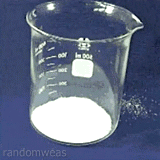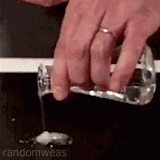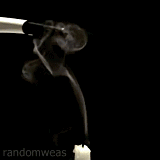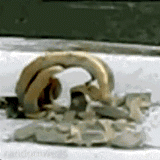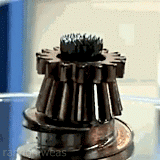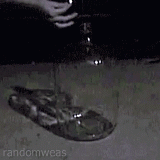1782 posts
Russians Recover Fresh Flowing Mammoth Blood


Russians Recover Fresh Flowing Mammoth Blood
About 15,000 years ago, an old female wooly mammoth plunged through the ice as she was being chased by predators. Her remains have now been uncovered by scientists working in Siberia. And remarkably, as they were digging it out, blood began to stream out - wich is weird given that it was 10° below freezing.
It’s not known if the blood or tissue samples contain living cells required for cloning. And even if such cells are recovered, the DNA repair would require a very complex process that could take years. A report is expected later this July.
The beautifully preserved specimen was discovered partially embedded in a chunk of ice at an excavation on the Lyakhovsky Island, the southernmost group of the New Siberian Islands in the Arctic seas of northeastern Russia.
The mammoth’s lower portions, including the stomach, were locked in the ice for the past 10,000 to 15,000 years. Its lower jaw and tongue were also recovered; the trunk was found separately from the carcass. The upper torso and two legs were preserved in soil and show signs of being gnawed upon by both prehistoric and modern predators.
Semyon Grigoriev, head of the Museum of Mammoths of the Institute of Applied Ecology of the North at the North Eastern Federal University, is calling it “the best preserved mammoth in the history of paleontology.”
During the excavation, and as the researchers were chipping away at the ice, they noticed splotches of dark blood in the ice cavities below the mammoth’s belly. When they broke through with a poll pick, blood started to flow out.
“It can be assumed that the blood of mammoths had some cryo-protective properties,” noted Grigoriev. Mammoth blood, it would appear, contains a kind of anti-freeze. This is consistent with work done by Canadian geneticists who in 2010 showed that mammoth hemoglobin releases its oxygen much more readily at cold temperatures than that of modern elephants.
In addition to the blood, the paleontologists also recovered well-preserved muscle tissue. The scientists say it has a natural red color of fresh meat. The blood is currently undergoing a bacteriological analysis, and the results are expected soon.
Based on the preliminary evidence, the scientists say the female wooly mammoth was anywhere from 50 to 60 years old and weighed about three tons. They theorize that she was trying to escape from predators when she fell through the ice, or that she got bogged down in a swamp.
-
 sphinxnomore liked this · 2 years ago
sphinxnomore liked this · 2 years ago -
 stephannatural reblogged this · 2 years ago
stephannatural reblogged this · 2 years ago -
 ssolson8550 liked this · 2 years ago
ssolson8550 liked this · 2 years ago -
 justremainingmyself liked this · 4 years ago
justremainingmyself liked this · 4 years ago -
 bumblebee-eyebrows liked this · 8 years ago
bumblebee-eyebrows liked this · 8 years ago -
 i-am-emerald-dust liked this · 8 years ago
i-am-emerald-dust liked this · 8 years ago -
 valverasofia liked this · 8 years ago
valverasofia liked this · 8 years ago -
 ravenwaltz liked this · 9 years ago
ravenwaltz liked this · 9 years ago -
 californiahippiebitch reblogged this · 9 years ago
californiahippiebitch reblogged this · 9 years ago -
 tarttism liked this · 9 years ago
tarttism liked this · 9 years ago -
 entzleboffin liked this · 9 years ago
entzleboffin liked this · 9 years ago -
 willischillen liked this · 9 years ago
willischillen liked this · 9 years ago -
 kissesfrommaryjane reblogged this · 10 years ago
kissesfrommaryjane reblogged this · 10 years ago -
 who-artthou liked this · 10 years ago
who-artthou liked this · 10 years ago -
 punkassbookj0ckeys reblogged this · 10 years ago
punkassbookj0ckeys reblogged this · 10 years ago -
 tathrin reblogged this · 10 years ago
tathrin reblogged this · 10 years ago -
 lisahawkeye reblogged this · 10 years ago
lisahawkeye reblogged this · 10 years ago -
 lisahawkeye liked this · 10 years ago
lisahawkeye liked this · 10 years ago -
 narcisste reblogged this · 10 years ago
narcisste reblogged this · 10 years ago -
 chubby-chinchill-a-blog liked this · 10 years ago
chubby-chinchill-a-blog liked this · 10 years ago -
 quantumtardis liked this · 10 years ago
quantumtardis liked this · 10 years ago -
 journey-nibs reblogged this · 10 years ago
journey-nibs reblogged this · 10 years ago -
 journey-nibs liked this · 10 years ago
journey-nibs liked this · 10 years ago -
 burningupasuntosay reblogged this · 10 years ago
burningupasuntosay reblogged this · 10 years ago -
 chaoticgayy reblogged this · 10 years ago
chaoticgayy reblogged this · 10 years ago -
 burningupasuntosay liked this · 10 years ago
burningupasuntosay liked this · 10 years ago -
 chaoticgayy liked this · 10 years ago
chaoticgayy liked this · 10 years ago -
 greatspacedustbin reblogged this · 10 years ago
greatspacedustbin reblogged this · 10 years ago -
 butterlemon liked this · 10 years ago
butterlemon liked this · 10 years ago -
 unbanned-rescue-cat reblogged this · 10 years ago
unbanned-rescue-cat reblogged this · 10 years ago -
 unbanned-rescue-cat liked this · 10 years ago
unbanned-rescue-cat liked this · 10 years ago -
 aolady reblogged this · 10 years ago
aolady reblogged this · 10 years ago -
 cup-a-joe-in-the-early-morn reblogged this · 10 years ago
cup-a-joe-in-the-early-morn reblogged this · 10 years ago -
 noahfromthesea liked this · 10 years ago
noahfromthesea liked this · 10 years ago -
 ohmycowholygosh reblogged this · 10 years ago
ohmycowholygosh reblogged this · 10 years ago -
 ohmycowholygosh liked this · 10 years ago
ohmycowholygosh liked this · 10 years ago -
 kilifruit reblogged this · 10 years ago
kilifruit reblogged this · 10 years ago -
 thevegantimelord liked this · 10 years ago
thevegantimelord liked this · 10 years ago -
 iamthestrange reblogged this · 10 years ago
iamthestrange reblogged this · 10 years ago -
 ariamzk liked this · 10 years ago
ariamzk liked this · 10 years ago -
 justonecoffee reblogged this · 10 years ago
justonecoffee reblogged this · 10 years ago -
 fantabulousass reblogged this · 10 years ago
fantabulousass reblogged this · 10 years ago -
 love-world-of-neverland liked this · 10 years ago
love-world-of-neverland liked this · 10 years ago -
 gandalfthegraysfireworks reblogged this · 10 years ago
gandalfthegraysfireworks reblogged this · 10 years ago -
 themonkeespaw reblogged this · 10 years ago
themonkeespaw reblogged this · 10 years ago
More Posts from Themanfromnantucket
a man steals a painting from a museum and puts it in the back of his van
he drives for three miles before he inevitably slows down and gets out, credit card and empty gas container in hand
the police come up and ask him “what are you doing? this is an arrest!”
he looks at them and says
“I need more Monet to buy Degas to make this Van Gogh!”
this is the final straw im leaving tumblr
See you tomorrow
The fact that there are bugs that look like leaves and eels with electricity and frogs that ooze out crazy psychedelic poison makes me soo mad like humans don’t have shit ooo my big brain whoopee where’s my fucking night vision or my wings to fly with what the shit evolution u blew it buddy

Today’s Google doodle is composed of interactive petri dishes in celebration of Julius Petri’s 161st birthday!

ALOIN CELLS:
Botanist Anatoly I. Mikhaltsov of the Children’s Ecological and Biological Center in Omsk, Russia, was studying the anatomy of Aloe erinacea, an endangered species of aloe endemic to Namibia, when he captured this image of the plant’s aloin cells (blue)—which secrete a component of the gel-like sap that oozes from an aloe’s severed leaf—using a coloring method that he developed. The cluster of aloin cells is 300 microns wide. [Less] [Link to this slide]
Anatoly I. Mikhaltsov/Children’s Ecological and Biological Center

